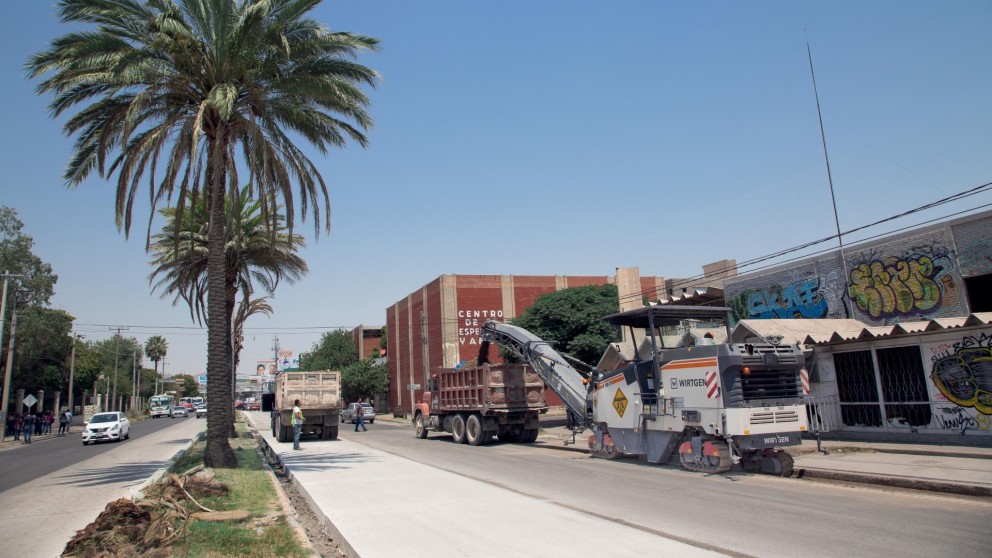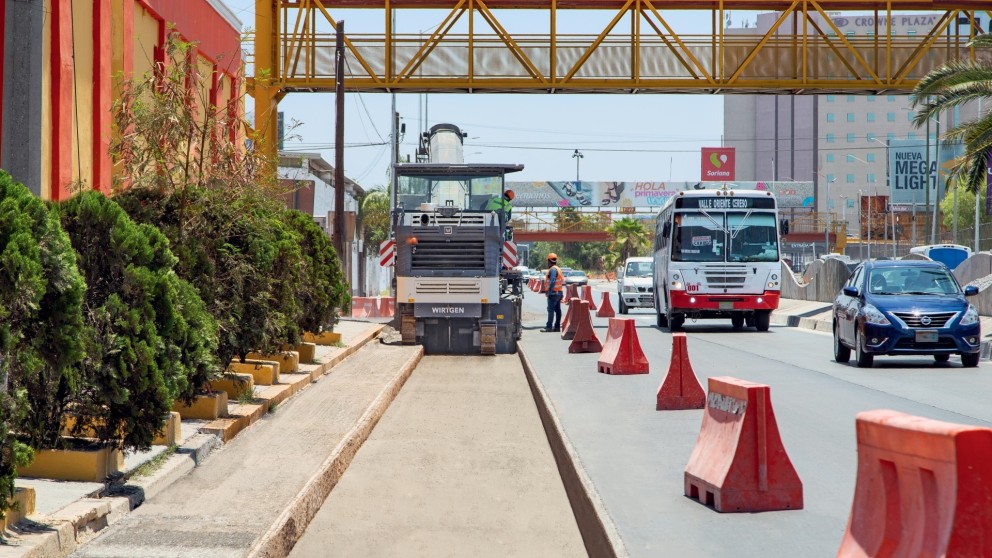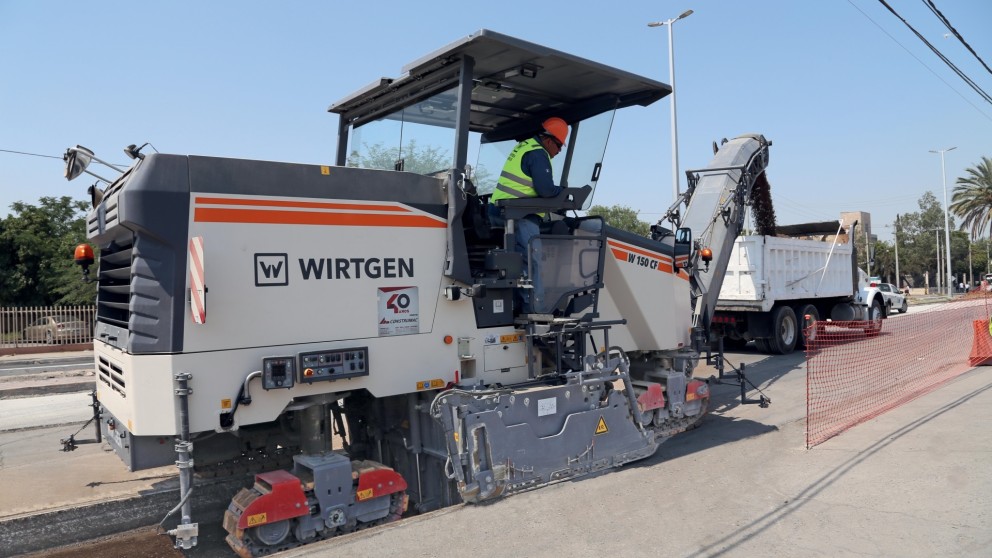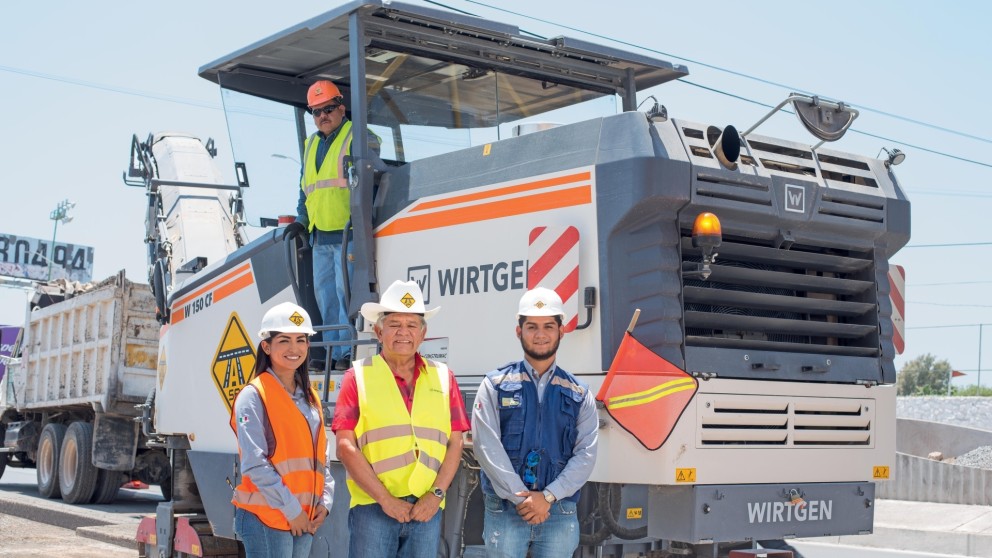Wirtgen W 150 CFi: Greater productivity and area output
In Torreón, Mexico, the Wirtgen W 150 CF compact milling machine is proving its prowess: equipped with the new 6-ft. (1800 mm)-wide milling drum assembly, it is removing the pavement along the main urban road so that a brand new Bus Rapid Transit (BRT) system can be implemented.
Precise milling result prepares the ground for increased mobility
The project in one of Mexico‘s most important economic and industrial centres includes a new, exclusive hydraulic concrete BRT lane plus the rehabilitation of two adjacent asphalt lanes. The project will result in better mobility, increasing traffic safety for city residents. However, before it could build the new lanes, milling contractor TATSA (Triturados Asfalticos de Torreón S.A de C.V.) faced the challenge of milling off the entire pavement at a maximum depth of 10 to 12 in. (25 to 30 cm).
The W 150 CF was capable of performing the milling work in one single pass, though TATSA sometimes milled off the pavement in two or three passes depending on the requirements of the respective stretch. “These roads are old and in the course of several years, they have been paved over many times without any milling work. In some areas, the pavement is even above the level of the footpath,” explained engineer Gisela Gutiérrez, Production Coordinator at TATSA.

High productivity, versatile and economical operation as well as simple transport make the Wirtgen W 150 CF/W 150 CFi compact milling machine with the new 1,800 mm milling drum assembly the ideal machine for surface course rehabilitation on medium to large job sites.
The entire project covers a length of 15 miles (24.3 km) and includes 5.8 miles (9.3 km) of inner-city lanes in Torreón and 9.3 miles (15 km) of highway between Torreón and Matamoros. The tender stipulated a single milling machine that could work at various different locations in the city within the same day. To fulfil this specification and best meet the demands of a large-scale project in confined spaces, the contractor chose Wirtgen’s W 150 CF with a 6 ft. (1800 mm) milling drum assembly. With the extended drum, the most powerful cold milling machine in the compact class can now be used even more flexibly and is ideal for surface course rehabilitation on medium to large job sites. Furthermore, the W 150 CF’s optimized machine transport weight – despite its tremendous engine power – was a clear advantage.
To maximize the cost-effectiveness of milling operations, cold milling machines need to be transported quickly from one job site to the next. The W 150 CF can be swiftly relocated on the job site or between contract work sections and has a travel speed of up to 4.6 mph (7.5 km/h). “Before participating in this tender, we talked to the applications experts from the Wirtgen Group dealer Construmac and soon agreed that the W 150 CF would be the best solution for this job.
The ordering authority agreed. After its arrival, the machine immediately convinced us. In the meantime, we have ordered a new model for further projects in Mexico,” says engineer Ruben Tinoco, proprietor of TATSA.

To increase productivity and area output, the W 150 CF / W 150 CFi can be equipped with 1,800 mm-wide milling drums by means of a housing extension.
Today, work on urban job sites must be completed much faster and more dynamically to minimize the impact on traffic, residents, workers and pedestrians. In Torreón, minimizing the disruption to traffic was therefore an essential goal. According to Tinoco, the plan is similar to those he has seen applied on job sites in Europe. “I spent a holiday in Finland. At 6 pm, a paving train composed of Wirtgen GROUP machines arrived in front of my hotel in Helsinki. The next morning when I got up, all the equipment was gone and the road was perfectly paved. We want our jobs in Mexico to be carried out just as quickly and efficiently, with minimal impact on traffic and to a high quality.”

Easy loading of milled material even in difficult job-site situations thanks to extremely large conveyor slewing angles of 60° both to the left and to the right.
To achieve optimum milling results, the W 150 CF offers state-of the art features. These include one of Wirtgen‘s core technologies – levelling. When the surface course is removed, the LEVEL PRO PLUS levelling system continually compares the actual milling depth with the current target milling depth. LEVEL PRO PLUS can work with a wide variety of sensors – cable, hydraulic cylinder, sonic and slope sensors or laser and sonic ski sensors as well as multiplex systems – and can be extended as required. 3D levelling is also possible thanks to integrated interfaces, which are compatible with 3D systems from common manufacturers.
In Torreón, TATSA used the multiplex system. With this system, three sensors on each side of the machine scan the height. The automatic levelling system factors all three measurements into its analysis so that the pre-set target milling depth is met exactly, while ensuring that any unevenness in the road surface is not copied. “Working with the Wirtgen LEVEL PRO PLUS levelling system is intuitive and convenient; the result is an evenly milled, level surface. This is a crucial factor when it comes to paving the new surface courses and avoiding costly correction measures in the form of asphalt levelling courses,“ says engineer Liborio Frias Estrada, Coordinator for the BRT project in Torreón. And Ruben Tinoco adds: “Cold milling has a key impact on the quality of road rehabilitation. That’s the reason why we rely on Wirtgen cold milling machines.“

“We rely on Wirtgen cold milling machines.” says Engineer Ruben Tinoco, proprietor of Triturados Asfalticos de Torreón S.A de C.V. (centre).